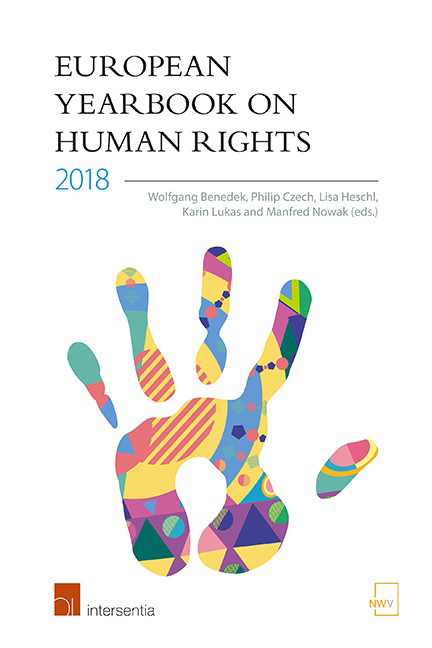Book contents
- Frontmatter
- Scientific Advisory Board
- Editors’ Preface
- Contents
- List of Abbreviations
- List of Contributors
- Part I Topic Of The Year
- Part II Eu
- The Court of Justice of the European Union and Human Rights in 2017
- Understanding Resettlement Through the Prism of Human Rights: A Case Study on the Resettlement in Belgium of Syrian Refugees from Lebanon
- The Decline of Fundamental Rights in CJEU Jurisprudence after the 2015 ‘Refugee Crisis’
- The EU Migration Crisis and the Human Rights Implications of the Externalisation of Border Control
- Does the EU Framework for Roma Integration Promote the Human Rights of Romani Persons in the Union?
- The EU Guidelines on Freedom of Religion or Belief at Their Fifth Anniversary: Implementation Lagging Behind?
- Human Rights Council in Troubled Waters: The EU as a Stabilising Factor
- Part III Coe
- PART IV OSCE
- Part V Others
- Part VI Book Reviews
- Index
Human Rights Council in Troubled Waters: The EU as a Stabilising Factor
from Part II - Eu
Published online by Cambridge University Press: 31 January 2019
- Frontmatter
- Scientific Advisory Board
- Editors’ Preface
- Contents
- List of Abbreviations
- List of Contributors
- Part I Topic Of The Year
- Part II Eu
- The Court of Justice of the European Union and Human Rights in 2017
- Understanding Resettlement Through the Prism of Human Rights: A Case Study on the Resettlement in Belgium of Syrian Refugees from Lebanon
- The Decline of Fundamental Rights in CJEU Jurisprudence after the 2015 ‘Refugee Crisis’
- The EU Migration Crisis and the Human Rights Implications of the Externalisation of Border Control
- Does the EU Framework for Roma Integration Promote the Human Rights of Romani Persons in the Union?
- The EU Guidelines on Freedom of Religion or Belief at Their Fifth Anniversary: Implementation Lagging Behind?
- Human Rights Council in Troubled Waters: The EU as a Stabilising Factor
- Part III Coe
- PART IV OSCE
- Part V Others
- Part VI Book Reviews
- Index
Summary
ABSTRACT
The Human Rights Council (HRC) is considered one of the world‘s most authoritative human rights bodies at international level. While the HRC is facing a number of criticisms because of its insufficient impacts on the ground, at the same time, victims of human rights violations still count on the Council‘s visibility and accessibility. The Member States of the European Union (EU) and the EU as such are among those who uphold these expectations to a certain extent. This article provides an overview of selected discussions and decisions at the HRC in the year 2017, particularly considering the contribution by the EU and its Member States towards good practice. The section on Syria highlights the HRC‘s multi-year investigations, which have informed decision-makers at the highest level of the United Nations and will pave the way for holding the culprits accountable at a later stage under more conducive circumstances. Compared to a world which apparently suffers from a massive deconstruction of human values, the article addresses the HRC‘s good practice in sustaining a human rights centred discourse. In this context, the article further examines the contributions of EU in the HRC to keep human rights standards as well as the pertinent discourse alive.
INTRODUCTION
The United Nations (UN) HRC emerged in 2006 to become one of the world‘s most authoritative human rights bodies. Against all odds in the first four years of its existence, the HRC has set up new processes for scrutiny of human rights issues, initiated vital investigations into new crises and severe human rights violations, and consolidated the Universal Periodic Review (UPR). The UPR is meanwhile (2018), in its third cycle. The HRC has shown flexibility and has been alert to crises or fast-deteriorating situations. Although the Council was less responsive to chronic or continuing human rights violations, the situation in Syria, for instance, has shown that the HRC has been able to maintain the flow of accurate and timely information. Irrespective of a certain exhaustion of the pertinent mechanisms and instruments, the HRC provided the data necessary to enable, in particular, the UN Security Council (UNSC) to adequately act upon the situation in Syria in accordance with human rights and international humanitarian law.
- Type
- Chapter
- Information
- European Yearbook on Human Rights 2018 , pp. 211 - 226Publisher: IntersentiaPrint publication year: 2018



